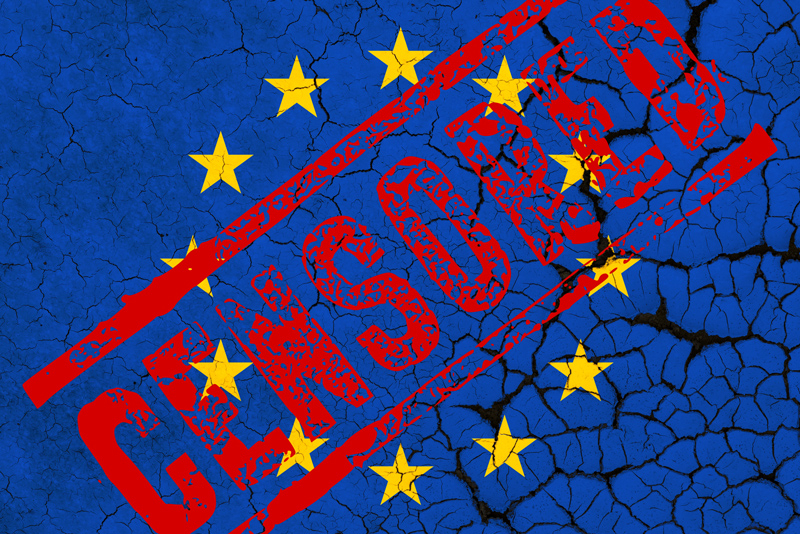by Judith Bergman • January 13th
Sadly, the main victims of many of the abuses that the European Commission seemingly wishes to silence are often Muslims, often women and children, and often too scared to speak out.
One of the foremost tools used by the EU is its "Code of conduct on countering illegal hate speech online," including hate speech against Muslims. By signing up to the Code, the major technology and social media corporations have committed themselves to censoring the internet on behalf of the EU.
Apparently, it is no longer enough, as "each offense to a religion" is now "an offense to all", that members of one religion are offended. Now, it seems, according to the OSCE, every European is supposed to be offended in solidarity with them, as well.

On December 3, the European Commission hosted a "high-level conference to address intolerance, hate speech and discrimination affecting Muslims in the EU". According to the EU press release, "By sharing good practices, the aim of the event is to identify key actions at all levels to address intolerance, racism and discrimination against Muslims in the coming years". The event brought together over 100 "representatives of national authorities, civil society, academia, the religious community, EU agencies and international organisations."
by Douglas Murray • January 13th
The question to ask is why are there so many people in the Muslim community who would object to such an exhibition and why these extremists have so much sway (as opposed to merely being an embittered fringe) that they can actually get their way. If a church in Britain put on an exhibition about the Holocaust, it would not be forced to cancel it under pressure from any Holocaust-denying Anglicans.
So what is it about the fragility, and vulnerability of the Muslim community to the dictates of extremists that we can learn from an episode such as this one?
Quite a lot, I would suggest. Which is one of the reasons why there has been so little focus. Because what can be learned from such events are lessons that, as a society, we still seem distinctly unwilling to learn.

On New Year's Eve in Manchester, England, a 25-year-old man began stabbing people at random on a platform at the city's Victoria Station, while reportedly shouting ISIS slogans. Pictured: Victoria Station in Manchester. (Image source: Mike Peel/Wikimedia Commons)
An enormous amount about the hopes and expectations of a society can be learned from the news that people want to report and the stories its readers apparently want to hear. An equally large amount -- perhaps even more -- can be learned from the stories they would most likely rather not hear and the facts they would probably prefer not to know about.
The former situation can be seen after any Islamist terrorist attack in the West, when people are immediately given 'good news stories' either to dampen any rage they might be feeling or distract from any difficult questions they might be asking. On New Year's Eve in Manchester, England, for instance, a 25-year-old man began stabbing people at random on a platform at the city's Victoria Metrolink station. It appears that the venue was chosen because it is near the Manchester Arena, where Salman Abedi murdered 22 people in a suicide-bombing at a pop concert in May 2017.
by Amir Taheri • January 13th
President Obama posed as a defender of human rights but refused to lift a finger to help Iranians rising for democracy and Syrians fighting for dignity. President Trump is being castigated for something which he might do but hasn't done yet, while many of his predecessors actually did.
Gary Cooper had a choice: Stand and fight or jump into the cabriolet where his new bride was waiting to start their honeymoon trip.
Unwittingly, perhaps, and in his unorthodox way, Trump may have invited Americans to also contemplate the choice they have.

2,000 troops in Syria give the US a say in shaping the future of Syria, which must now be regarded as a territory without a functioning government. The question is how much of a say? Pictured: US Marines observe as supplies are dropped near At-Tanf Garrison, Syria on September 7, 2018. (U.S. Marine Corps photo by Cpl. Carlos Lopez)
Like some of his other quick-tweet decisions, President Donald Trump's announcement, last month, on troop withdrawal from Syria, triggered a tsunami of instant-coffee comment, most of it adverse.
Ardent advocates of global retreat by the United States feigned anger because Trump was doing what their darling Barack Obama dared not contemplate. Dyed-in-the-wool isolationists hailed the tweet as the start of a return to the Monroe Doctrine, while pathological Trump-haters labeled it as another example of his supposed subservience to Vladimir Putin.
Had everyone waited a little bit longer, the storm-raising tweet may have looked different in the manner that a hologram seems different from different angles.
If a week is a long time in politics, a month must be four times longer. So, what does the quick-tweet "decision" look like now?
|
|
|




No comments:
Post a Comment